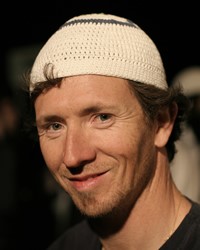Jewish, Eastern Yiddish-speaking in Kazakhstan

Photo Source:
Copyrighted © 2026
paul prescott - Shutterstock All rights reserved. Used with permission |
Send Joshua Project a map of this people group.
|
| People Name: | Jewish, Eastern Yiddish-speaking |
| Country: | Kazakhstan |
| 10/40 Window: | Yes |
| Population: | 4,300 |
| World Population: | 808,900 |
| Primary Language: | Russian |
| Primary Religion: | Ethnic Religions |
| Christian Adherents: | 0.00 % |
| Evangelicals: | 0.00 % |
| Scripture: | Complete Bible |
| Ministry Resources: | Yes |
| Jesus Film: | Yes |
| Audio Recordings: | Yes |
| People Cluster: | Jewish |
| Affinity Bloc: | Jewish |
| Progress Level: |
|
Introduction / History
The word Ashkenaz is derived from a biblical word for the larger Germanic region of Europe. Therefore, Ashkenazim Jews are those whose ancestry is linked to that area. This group traditionally speaks the Yiddish language, which is a German dialect with Hebrew and Slavic elements. Yiddish, the language of the Ashkenaz, has two major dialects as well as smaller ones. Western Yiddish is the language of those who have some roots in Germany and Central Europe. Eastern Yiddish is the language of Russia, and Eastern European countries like Poland, Estonia, Lithuania Moldova, etc.
In the 1800s, some of these Eastern Yiddish speaking Jews fled Russian persecution hoping for a safe haven in Kazakhstan. In the 1930s, more of them fled to Kazakhstan from Soviet dictator Josef Stalin's excesses. Others came there during WWII to flee the fighting. They built their own community but worshipped the Lord at home rather than at synagogues.
Kazakhstan's Jewish population is usually either in Almaty or Astana.
What Are Their Lives Like?
Today there are a couple of small Jewish communities in Kazakhstan. Among them are the Eastern Yiddish speakers. They have 20 Jewish organizations. These include day schools and youth centers where teenagers can learn about their Jewish heritage. They have programs for summer camps, elder care and food distribution.
There is very little anti-Semitism in Kazakhstan, a Muslim nation with a surprising amount of religious tolerance. Jewish teachers instruct from the Torah and help keep the kosher tradition alive in this Central Asian country. These teachers are from the Chabad Lubavitch Hasidic sect in Brooklyn, New York. Kazakhstan has good relations with Israel, a nation that has helped them improve their irrigation systems.
What Are Their Beliefs?
For religious Jews, God is the Supreme Being, the Creator of the universe, and the ultimate judge of human affairs. Beyond this, the religious beliefs of the Jewish communities vary greatly. Orthodox Jews follow the traditional religious beliefs and practices found in the Jewish literature that interprets Scripture regarding ethical, religious, civil, and criminal matters.
Reform Jews do not believe that God reveals the Jewish Law. They are not restricted to kosher foods. They neither wear the skullcap (yarmulke) when praying nor use Hebrew in prayer. All religious Jews believe in the coming of a Messianic Age, but only the Orthodox Jews look for a personal Messiah.
Many Jewish people keep cultural Judaism, but they have rejected the spiritual elements taught in the Old Testament. They might take part in cultural events and even religious ceremonies, but they are secular or New Age in their spiritual lives.
What Are Their Needs?
Jewish people have a wonderful understanding of their connection with the Abrahamic Covenant. However, they also have a history of rejecting Jesus Christ as Messiah, the one who has fulfilled that covenant. They tend to view Christianity as the religion of their oppressors rather than the fulfillment of what God promised all of humanity through Abraham centuries ago.
Prayer Points
Pray for the Holy Spirit to give the Eastern Yiddish speaking Jews in Kazakhstan teachable and understanding hearts.
Pray that a strong movement of the Holy Spirit will bring entire Yiddish speaking families into a rich experience of God's blessing.
Pray for Jewish families to be drawn by the Holy Spirit to seek forgiveness, and to understand the adequacy of Christ's work on the cross.
Pray for teams of believers to do sustained, focused prayer for the Lord to open the hearts of Yiddish speaking family leaders to experience God's blessing through a movement of family-based discovery Bible studies.